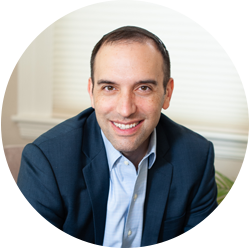
Shalom Chaverim (Dear Friends),
We are coming to the end of Mental Health Awareness Month, which has taken on new meaning this year. In addition to the other tragic dimensions of this pandemic, social distancing, isolation, loss, stress, and anxiety are exacerbating mental health challenges that were already so prevalent in our society.
This month, we are talking about and working to destigmatize mental illness. Here in Boston, in partnership with the Ruderman Family Foundation, CJP’s Ruderman Synagogue Inclusion Project (RSIP) hosted three webinars to explore issues related to mental health.
After two webinars with mental health experts, last night was a little different: We came together in song. Special guests Rabbi Menachem Creditor and Neshama Carlebach lifted us up with their soulful voices, inspired us with traditional and contemporary lyrics, and comforted us with their teachings.
I admit that when I first heard about this, I asked myself: What does Jewish spiritual music have to do with mental health? So I started to reflect on the power of song.
Yesterday, the United States hit the staggering number of 100,000 coronavirus-related deaths. Many of us saw the front page of The New York Times last Sunday; the list of names, of human lives lost, was simply overwhelming. On one hand, it feels like summer has arrived and things are starting to open back up. On the other hand, we are living with confusion about what it means to "return" to a "new normal" and fears of so much still unknown. And then there’s the grief — so much grief — whether we are conscious of it or not.
At a time like this, it often feels as if words alone cannot capture our emotions. Yet, song seems to come from and touch a deeper part of us — a place beyond, a place beneath the words. Music can help us express feelings that we didn’t even know existed. And that is one of the ways we cope, and one way we heal.
The mystics of the Jewish tradition taught that our souls are always singing. It’s just that sometimes, we don’t slow down enough or listen carefully enough to hear them. When the world feels dark, sometimes it can be hard to see the light, let alone to shine our light into the world when it needs us most. Song reminds us that the voice inside each of us is singing, even if we can’t hear it; that the spark in each of us burns bright, even when we ourselves cannot see it.
Tonight is the holiday of Shavuot, which commemorates the receiving of the Torah at Mount Sinai. According to our tradition, when the Israelites arrived at Sinai — after leaving Egypt, crossing the sea, wandering, and bickering through the wilderness for months — they had transformed. When they encamped at the base of the mountain, they were, in the words of the rabbis, "Like one person, with one heart." A state of radical unity and connectedness is the prerequisite to receiving the Torah because the awesomeness of the Sinai experience and the responsibilities that come with it are too much for any of us to encounter alone.
Song brings us together in ways that few other mediums can. Whether at a symphony, an opera, a rock concert or, maybe, even a prayer service, many of us have experienced a sense of unity and connection in moments of song. When we feel it, we know on a visceral level that we are not alone.
And that is one of the most powerful and critical messages that we need to shout from the rooftops during Mental Health Awareness Month and during this crisis: We are not in this alone.
This is what Ruderman Synagogue Inclusion Project is all about: ensuring that our synagogues, our spiritual communities, are places where anyone looking for meaning and connection can find them. Where no one needs to be on the outside looking in.
I am so grateful to our partners at the Ruderman Family Foundation for their generosity and their leadership, and to the rabbis, educators, volunteers, and leaders across this community who have lifted their voices together in the name of creating a vibrant, connected, inclusive Jewish community.
May we sing together in person (safely, of course) again soon.
Chag Sameach (Happy Shavuot),
Rabbi Marc Baker

About the Author
CJP President and CEO Rabbi Marc Baker is an educator, writer, and leadership mentor who is devoting his life to Jewish learning and building Jewish communities.
